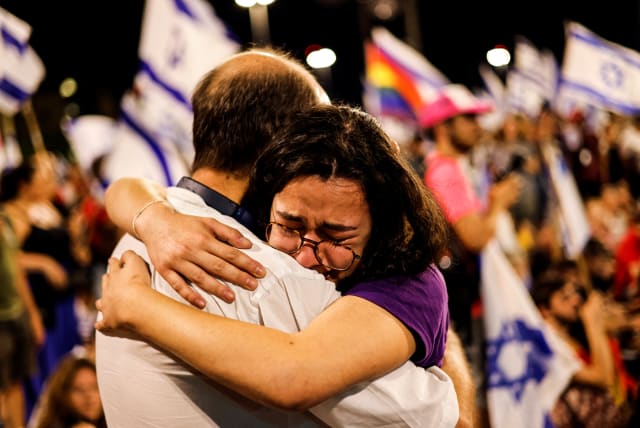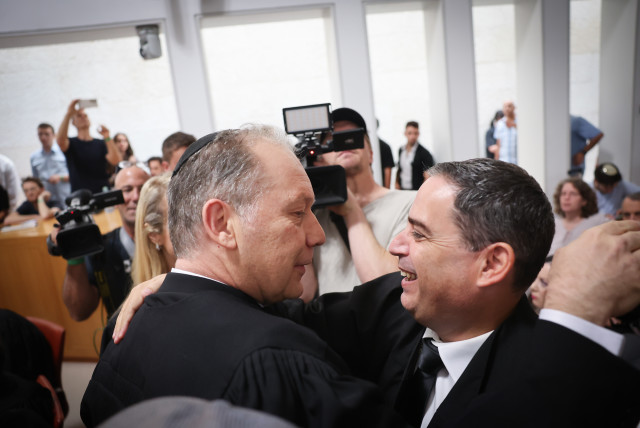Saying goodbye to a year better forgotten

NATIONAL AFFAIRS: May the questions over Israeli democracy and social divisions stay in 5783.
Well, thank God that’s over – the Jewish year 5783, that is.
On November 24, 1992, Queen Elizabeth delivered a now-famous speech as part of celebrations marking her 40th year on the throne: “Nineteen ninety-two is not a year on which I shall look back with undiluted pleasure,” she said, using signature understatement to describe a year during which three of her children’s marriages unraveled very publicly and a fire swept through her castle.
“In the words of one of my more sympathetic correspondents, it has turned out to be an annus horribilis,” she added, employing the Latin term for a horrible year.
Substitute 5783 for 1992, replace the queen’s “I” with a collective Israeli “we,” remove the bit about “one of my more sympathetic correspondents,” and then the late queen’s quote aptly sums up how many Israelis feel as the year mercifully ends Friday at sunset: “5783 is not a year on which we shall look back with undiluted pleasure... it has turned out to be an annus horribilis.”
If only our national problems, however, were limited to troublesome marriages in the family or some damage to property.
This was a year during which the country felt, at times, as if it was coming unglued, unhinged. It was a year in which the state seemed to have lost its moorings, its equilibrium, in which it felt like the apple cart was on the verge of tipping over.
It was a year during which the nation looked with yearning eyes for a responsible adult to step into the chaos, clean up the mess, and magically make it all right.
Yet that responsible adult – that leader – never showed up.
It was a year during which the seemingly innocuous question, “How are you doing?” asked by radio or television interviewers, frequently elicited this response: “Personally, excellent; nationally, miserable.”
It was a year during which the phrase “What in the world are we doing to ourselves?” was on the lips and in the minds of countless people.
These words were spoken or thought when individuals unsuited for high office were made senior government ministers; when opposition leaders spoke of civil war and when efforts to fundamentally change the country’s balance of power were made with little consideration for half the country that was adamantly opposed; when protest leaders confused Benjamin Netanyahu with Francisco Franco; when MKs accused the Israel Security Agency (Shin Bet) of not knowing who the enemy is; when a former Mossad head accused Israel of apartheid; when a senior minister suggested wiping a Palestinian town off the map; when reserve pilots said they would not show up for duty, and on and on and on.
It was a year in which so much of what seemed to define Israeliness – solidarity, shared destiny, cohesion, unity in times of crisis – seemed to fray and unravel. All of a sudden, solidarity evaporated, as those in one camp felt no bond with those in the other. Shared destiny was questioned as it became clear that the various tribes comprising the state of Israel had vastly different visions of the country’s destiny and future. Cohesion crumbled under a barrage of vitriolic rhetoric from leaders on all sides, amplified through social media. Despite the country being undeniably in a crisis – albeit of a different nature than usual – there was no unity in this crisis. On the contrary, disunity and divisions exacerbated the crisis.
A year that left us more questions than answers
OVER ITS 75-year history, Israel has known some very tough and challenging years. Years like 1949, when food was rationed; 1973, when the nation mourned nearly 3,000 casualties of the Yom Kippur War; 1991, when Scud rockets targeted civilian areas; 2002, when 457 people were killed in one harrowing year of terror. Israel has faced difficult periods and weathered them nobly.
But we are unaccustomed to a year like this – one where the crisis is self-inflicted. Israel deals well when the crisis originates externally. It excels at rallying together to fend off external threats. But what happens when the crisis is internal? Then what? With what forces do you rally, and whom do you rally against?
The year 5783 will be remembered as the year when so many issues that had been pushed under the rug for so long resurfaced, and they resurfaced with a vengeance.
Self-identity issues emerged. What does it mean to be a Jewish-democratic state? What does it mean for the state to be democratic? What does it mean for the state to be Jewish? Which part of the equation takes priority, and which one yields the right-of-way?
Governance issues took center stage, such as which government branch has the final say, the legislative or judicial? Military issues came to the fore, such as what it means to have a people’s army, who should serve, and what are the responsibilities of reservists. And, of course, the timeless question of what role religion should play in this particular state.
A very odd year
It was an odd year in that domestic issues eclipsed everything else.
True, there was terrorism, more of it than there has been in years. Yes, Iran continued to cast a dark cloud over us and the region. We worried about Hezbollah provocations and reportedly continued to act in Syria.
But even those issues, which typically dominate the national agenda, were overshadowed by debates about how the Supreme Court judges should be selected and whether it is reasonable for the court to use the reasonableness statute to strike down Knesset laws.
You know you’re in trouble when the year’s national highlight is a third-place showing in the under-21 World Cup. This isn’t to diminish the accomplishments of the young athletes who performed admirably in Argentina, but rather to say that if this was the main source of national pride in 5783, then we have some work to do.
AND INDEED, we do. We need to learn how to have civil public discourse. We need to rid ourselves of complete certainty and entertain the possibility, even a remote one, that those we disagree with might have valid points. We must stop demonizing the other side. We must be willing to compromise, and our leaders must embrace compromise rather than see it as a sign of weakness.
We must recognize that what we have here is neither a given nor guaranteed and that it could vanish just as it materialized.
This was a year that led some to wonder whether there is not some defective gene in the Jewish DNA making us prone to self-destruction. Because at times, it seemed we were hell-bent on doing just that: destroying so much of what was painstakingly built up here – the economy, the army, the courts, the governing institutions, and relations with Diaspora communities.
Here’s a prayer for the new year, the need for which would have been unthinkable just last Rosh Hashanah: May the State of Israel, the fulfillment of a 2,000-year-old dream, return to itself and to sanity. May its leaders and politicians love the country more than they hate and envy one another.
And may the people of Israel realize, and act upon the realization, that they are brothers and sisters, they have no other state, and that history will never forgive them if they blow this God-given chance at renewed Jewish sovereignty.•
Jerusalem Post Store
`; document.getElementById("linkPremium").innerHTML = cont; var divWithLink = document.getElementById("premium-link"); if (divWithLink !== null && divWithLink !== 'undefined') { divWithLink.style.border = "solid 1px #cb0f3e"; divWithLink.style.textAlign = "center"; divWithLink.style.marginBottom = "15px"; divWithLink.style.marginTop = "15px"; divWithLink.style.width = "100%"; divWithLink.style.backgroundColor = "#122952"; divWithLink.style.color = "#ffffff"; divWithLink.style.lineHeight = "1.5"; } } (function (v, i) { });

